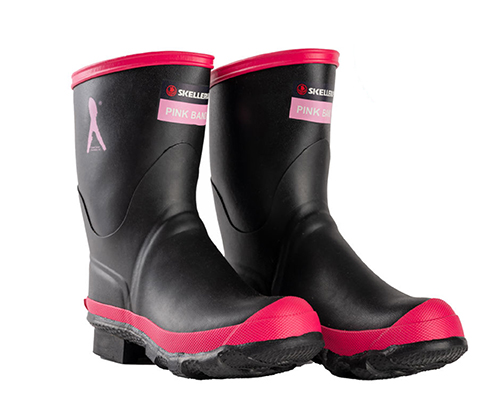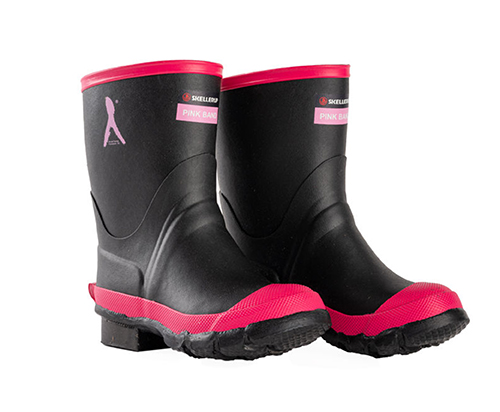

Skellerup Pink Bands
Words in association with Skellerup
Support Breast Cancer Awareness with Pink Band Gumboots
This October, Skellerup proudly launches its limited-edition Pink Band gumboots in support of Breast Cancer Awareness Month. Now in its fourth year, the Pink Band range has expanded to include new Children and Junior styles, making it easier for younger wearers to join the cause. By partnering with Breast Cancer Foundation NZ, Skellerup is raising vital funds for their life-saving mahi. This collaboration continues to spark excitement among gumboot lovers, all eager to show their support and help give breast cancer the boot.
Every day, nine people in Aotearoa are diagnosed with breast cancer. By purchasing a pair of Pink Band gumboots, five dollars will be donated directly to Breast Cancer Foundation NZ, bringing us two steps closer to zero deaths from breast cancer. Pink Band gumboots will be available in-store and online at Farmlands starting October 1, 2024, while stocks last.
Ah-Leen Rayner, chief executive of Breast Cancer Foundation NZ, says “The Pink Bands were a stroke of genius. They sold like hotcakes, so it’s great to see them back just in time for Breast Cancer Awareness month this October. “Every pair of gumboots sold will help our work in breast cancer education, research and patient support. And the benefits aren’t just financial – they’ve also helped to sparked important conversations about breast health, and the importance of early detection, in rural communities.”


What the funds go towards / BCFNZ’s work:
BCFNZ’s vision is to see zero deaths from breast cancer in NZ. They work towards this goal through four pillars of work:
- Education and awareness campaigns about the importance of finding breast cancer early. They spread the message that knowing the signs and symptoms, doing regular self-checks and going for mammograms are the keys to surviving breast cancer.
- Investment in ground-breaking research to improve treatments and save lives.
- Providing free support services to New Zealanders going through breast cancer, and their whānau.
- Advocacy campaigns calling for better treatments and care for every New Zealander affected by breast cancer.
Some examples of some of BCFNZ’s current programmes/projects that are accessible and/or beneficial to rural New Zealanders:
- Specialist breast nurses provide tailored advice to patients anywhere in NZ through BCFNZ’s 0800 support line and online community, mybc.
- Breast nurses travel around the country in BCFNZ’s iconic Pink Campervan to talk to communities about mammograms and breast health. They get out to smaller places that don’t have access to specialist health services available in the cities.
- Nurse educators visit workplaces and community events to increase breast health awareness. They attend the NZ Rural GP Conference and visit GP clinics around the country to upskill practice nurses in breast health.
- Regular interactive webinars are held on a range of topics affecting breast cancer patients, giving viewers the opportunity to learn from and ask questions of top medical experts, without having to leave home.
- BCFNZ funds Te Rēhita Mate Ūtaetae - Breast Cancer Foundation National Register. The register tracks the diagnosis and treatment of every woman with breast cancer, and is a vital tool for doctors and researchers to make sure all patients can get the same high standards of care and advances in treatment, no matter where in NZ they live.
Some of the challenges faced by rural New Zealanders affected by breast cancer:
- One third of breast cancers are diagnosed from outside of NZ’s main centres. For rural communities, a breast cancer diagnosis often brings with it added complexities.
- Patients in rural communities are more likely to choose to choose radical surgical options (i.e. mastectomy rather than breast-conserving surgery), generally because radiation therapy is largely available in the main centres and for most patients requires daily treatment for at least three weeks. The realities of farm life mean it’s not always possible for rural patients to take weeks (or months) off to receive treatment.
- Isolation can also be an issue if patients are having to leave their families behind on the farm while they go off for treatment.
- Rural people having a ‘she’ll be right’ attitude when it comes to breast health is a concern – it’s important to prioritise going for mammograms and be proactive about getting checked out if you know something isn’t right.
BCFNZ has lots of information and resources on their website – www.breastcancerfoundation.org.nz. And if anyone has any concerns or questions they can call BCFNZ’s specialist breast nurses on their free advice line – 0800 BC NURSE (0800 226 8773)
FEATURED PRODUCTS



Skellerup Pink Bands Wmns/Youth
Skellerup has partnered with the Breast Cancer Foundation New Zealand to launch a limited edition range of Skellerup Pink Bands.

Skellerup Pink Bands Children
Skellerup has partnered with the Breast Cancer Foundation New Zealand to launch a limited edition range of Skellerup Pink Bands.